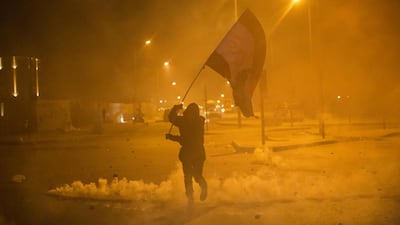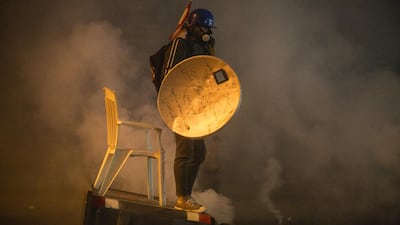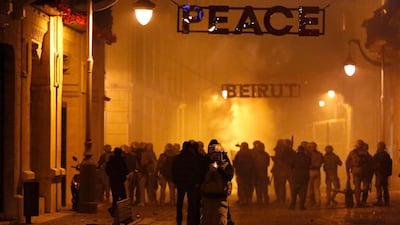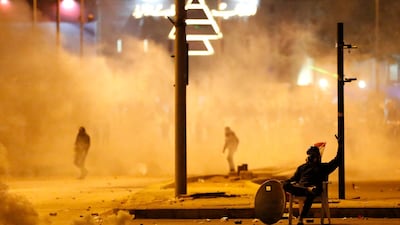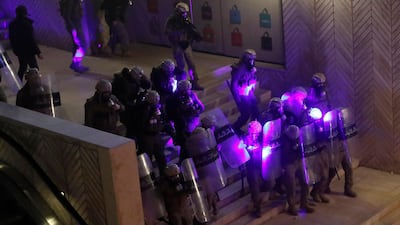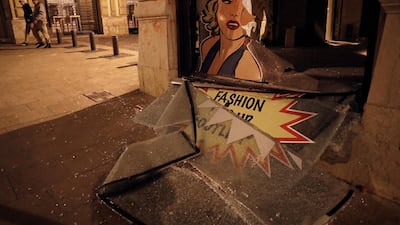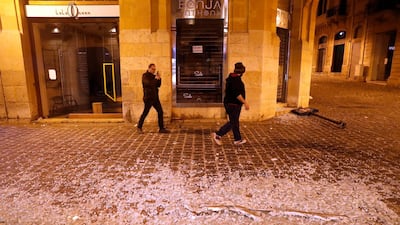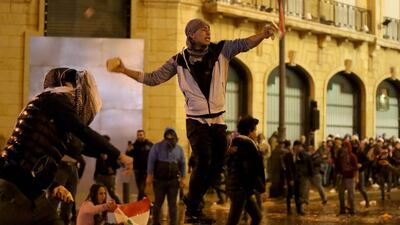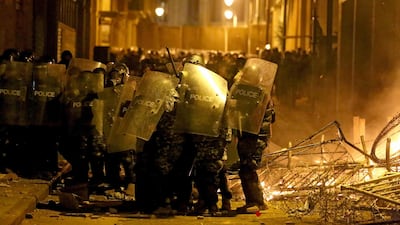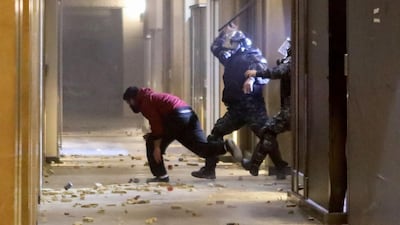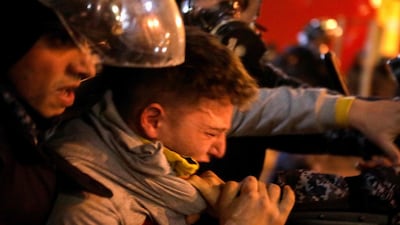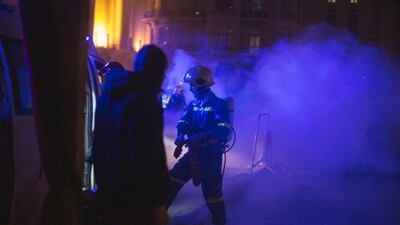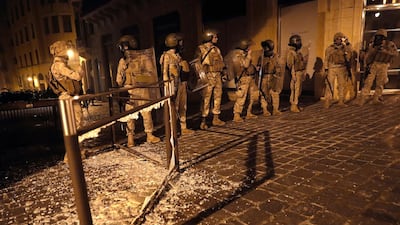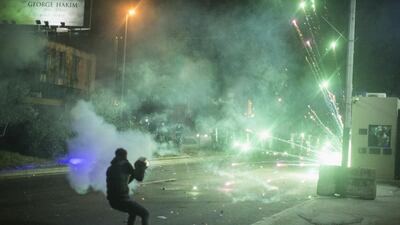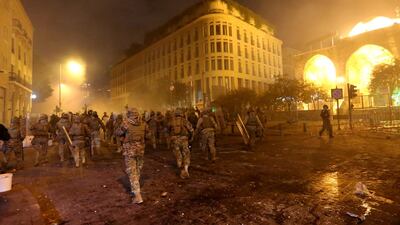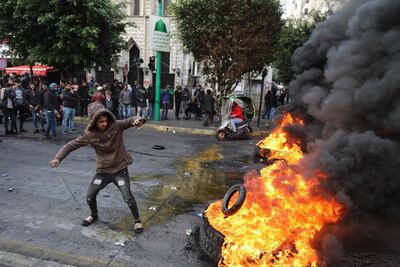Lebanon’s anti-government uprising entered its 100th day on Friday with protesters in a much darker mood, reflected in their new rallying cry.
“Not peaceful, not peaceful. It’s a revolution, not a ballad,” they chanted at protests in the past week, which were followed by battles with security troops in which hundreds of people were injured.
The anger and violence is a far cry from the peaceful rallies previously held across the country as people called for the removal of an entrenched political elite accused of corruption and mismanagement, leading to an economic crisis.
Violent protests continued even after the appointment on Tuesday of a new government that is ostensibly comprised of non-partisan technocrats, one of main demands of protesters.
To the protesters, the new government that replaced one led by Saad Hariri – who resigned in late October – was another administration beholden to the same politicians and community leaders they want to remove. They fought with police for hours on Wednesday night, with the police using rubber bullets, tear gas and water cannon.
"It seems that the whole movement is becoming more radical," said Emilie Sueur, editor-in-chief of Lebanese newspaper L'Orient-Le Jour.
“It does not mean that all protesters are ready to get involved in radical actions, but there seems to be a broader acceptance of a path towards a more radical approach.”
Some protesters say they are staying off the streets because they disapprove of violence, but others say the time for peaceful protests is over because non-violence yielded no results.
“The revolutionaries abandoned peaceful tactics because those they seek to remove from power were only too happy to see them just singing and dancing on the streets,” said Dalia Khamissy, a freelance photographer who has taken part in the protests.
But violence is an uncomfortable path to follow in a country still, in many ways, affected by a 15-year civil war. That conflict, which was fought along sectarian lines, ended in 1990 with a political pact that enshrined those divisions. The leaders of the war also became the country’s top politicians.
“The same people who killed us during the civil war are in power now and they are starving us,” Ms Khamissy said.
"They have destroyed the country during the war and now they are blaming us for throwing rocks?”
Protester Mustafa Ajouz, 50, a Customs clearing agent from Beirut, said on January 19, the day after the worst rioting: “How much do you think was the cost of the vandalism last night?
"It was absolutely nothing when compared to what our politicians stole over the years."
Lebanon’s uprising began on October 17 as protests against a government proposal to tax calls made through WhatsApp, a popular free alternative to the high charges from telecoms companies.
The protests soon became a movement seeking an end to the sectarian-based political system and corruption.
The goals and grievances are similar to those of the protest movement launched two weeks earlier in Iraq, where a sectarian-based political system has been in place amid widespread corruption since the 2003 US-led invasion toppled dictator Saddam Hussein.
Diala Chehade, a lawyer and activist in Beirut, said the WhatsApp tax might have been the last straw in the mounting list of woes faced by ordinary Lebanese over recent months and years.
“People have been hit by a series of crises in quick succession, from additional taxes and environmental problems to unemployment, rising prices, rickety infrastructure and inadequate services,” Ms Chehade said.
“Corruption has always been there. Lately, it has reached an obscene level.”
Some activists and protesters are calling the uprising a “revolution of the hungry” – a description supported by the heavy participation of residents of Lebanon’s poorest regions, such as those to the north and south of Beirut.
“I am here to demand my rights, find work and live a normal life,” said Ali Othman, 20, an unemployed blacksmith from the northern Akkar region.
“This revolution will not end until they all go. Whether it’s difficult or easy, they still must go. But until now, there is nothing to suggest that it’s happening."
The anger over the economy is seen from the specific businesses vandalised by the protesters: banks, seen as primarily catering for the rich and powerful and linked to senior politicians; providers of mobile phone services, who are loathed for charging among the highest rates in the region; and high-profile businesses known to be owned or partly owned by politicians.
Lately, the central bank has also become a target for protesters because of the limits banks have imposed on cash withdrawals and transfers, saying it is because of the liquidity shortage caused by the economic crisis.
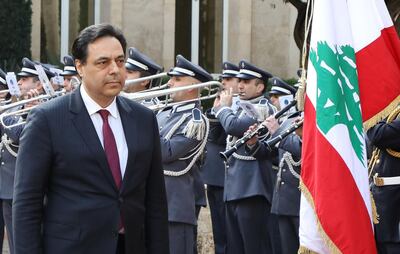
The concrete blast barriers topped by razor wire that have been set up around the central bank headquarters in central Beirut are covered in graffiti, most against its governor Riad Salameh, who has held the job since 1993 and is known to have close links to senior politicians.
Across the street from the bank, a few heart-rending words scribbled in black offer an insight into the plight of the Lebanese: “Poverty consigns simple dreams to their grave.”
As in every uprising in the region over the past decade, the graffiti and slogans in Lebanon reflect the mood of the revolution and provide a record of sorts of the monumental events unfolding. In Lebanon, however, the profanities unique to the Mediterranean nation give them an edge.
One graffiti message describes Lebanon as a “nation of sheep, ruled by wolves", while another says the revolution is “a people’s revolt against their own fears”.
“Oh, you poor people, they conned you under the name of religion,” says another, a reference to the sectarian nature of powerful political groups.
“Shite or Sunni, [profanity] sectarianism,” is among the most popular chants.
Amid the general clamour for change, the talk of some activists suggests expectations that may have little chance of becoming reality.
“As far as the revolutionaries are concerned, anyone who participated in government from 1990 until now is a target, regardless of whether he or she was passively or actively participating in corruption,” Ms Chehade said.
“Anyone who ruled Lebanon will not be spared the responsibility for the corruption that happened and for starving people.”
Protester Abdul Fattah Seif El Deen, 53, from the southern city of Sidon, tells a story that speaks to the economic hardship that affects so many and the political patronage system that rewards loyalty with jobs and bank loans, school admissions and pensions.
Mr Seif El Deen works as a driver for a Sidon company, chauffeuring its top executive for 1.1 million Lebanese pounds (Dh2,680) a month.
Lately, his employer cut his salary to 600,000 pounds with a promise that he would be paid the full amount when bank restrictions on withdrawals were lifted.
“I have sold a piece of land I own to put my oldest daughter through college," Mr Seif El Deen said.
"She graduated a year ago and she still cannot find work. People told me to go to a senior politician for help. I won’t.
"These people don’t just want loyalty, they want you to kneel down and worship them,” he said as he struggled with the effects of tear gas in downtown Beirut on January 18.
The political system the protesters seek to dismantle is deeply entrenched but they believe they are making progress.
“The change that this revolution has so far brought about is that people are no longer frightened,” said Hassan Zaaeity, 26, a protester from the eastern city of Baalbek who is studying engineering in Beirut.
"Day after day, the sectarian wall is collapsing."
Mr Seif El Deen said: “Those politicians who would have normally taken up ministerial posts so they can steal will now think twice before they steal.
"It won’t be as easy as it used to be. They will take into consideration that one day they will be held accountable.”
Sueur, a French citizen who has lived in Lebanon for about 20 years, believes change will take time given that the current political system has been in place for decades.
“The revolution has already registered some important victories. Today, there are cracks in different walls,” Sueur said.
“The simple fact that the movement gathers Lebanese from different regions, communities and social backgrounds is unique.
"In some ways, it looks like the birth of a new nation.”
